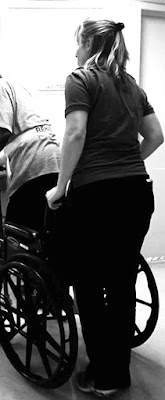Over a span of 14 years, at 6 different hospitals, and 3 different nursing and rehabilitation facilities, I met many extraordinary health service employees.
My caregiving days are over, but I can’t help but think about all of them today, as the nation endures a state of emergency due to the global pandemic.
I really hope they’re okay. To me, they are heroes; they are the real MVP’s.
We fiercely hold healthcare professionals and caregivers accountable if something goes wrong, but each day, they advocate and serve; risk their own health to alleviate the aches, pains, and disease of others. They’re communicating news, standards, and practices that many may not want to hear.
They go above and beyond what is required of them. They make decisions to keep in, and outpatients safe.
It stands to reason that the rest of us should be more considerate, patient, and understanding.
We should respect expertise, heed recommendations, consider knowledge, and not make things worse.
Healthcare workers are dealing with the unpleasantness. They attend to the helpless and the hardheaded; the docile, and the cantankerous; the cooperative and the defiant.
While we sleep, they’re working, studying, brainstorming, researching, collaborating, testing, and serving.
Sometimes we forget that they have families, too. God help us if the people who care, ever stop caring.
The men and women I encountered over the years, were not merely proficient concerning their profession, but they were compassionate, honest, patient, and caring.
They didn’t alarm, but they were firm.
Their aim, was healing. Their opinions mattered. They had to be objective, and keep their feelings in check, but their humanity always shined.
From them, I learned that I wasn’t just my father’s daughter. I was a caregiver. They made me a part of their team. My input, based on my daily interactions, observations, and documentation, actually mattered to them. They helped me to help him.
In this time of social distancing, I remember the many, pre-pandemic times that I heard, “It may be best to limit visitors.”, or “Everyone who enters his room is required to put on masks, gowns, and gloves.”
I don’t know why the rules, recommendations, and wisdom we hear, from experienced people, are often considered offensive, unnecessary, or intrusive.
We insist on having our rights, but ignore the responsibilities that amend, and drive them.
We balk at what we think is overreacting; we don’t like change in our methods or routines;
we think we know better, and we stupidly complain, question, argue, push back at, and defy knowledge that could protect, and educate us.
In minimizing wisdom, and failing to err on the side of common sense, we run the risk of making things worse.
Too often we have nothing except tears, apologies, and regret, when faced with consequences that were wholly preventable.
Even in less stressful times, those in healthcare professions can be overwhelmed. Sometimes, simply listening and learning is the best medicine for all of us.
Of all of the messages and instructions I was given, by the conscientious people who attended to my Dad, one was consistent. It wasn’t for him, but for me: “Your health matters, too. You can’t care for anyone if you’re sick. Take care of yourself.”
I’d respond that I was okay, but learned that even those who feel perfectly fine, can be problematic to those whose immune systems are weak, or compromised.
I got compliments, jokes, and chastisement about how clean I’d kept my Dad’s house, but I just brushed it off. I was raised by two clean, tidy people, so the standard was already ingrained, but the health professionals I’d encountered over the years, always stressed the necessity for a clean environment, too.
It tickles me today, when I read about the run on Clorox, Lysol, sanitizing wipes, and paper towels. Cleanliness is apparently making a comeback.
It’s imperative for the ailing among us, that we’re vigilant about our own hygiene, and how we maintain the surroundings of those who are ill.
I’ll never forget the young lady who cleaned my Dad’s room, at Inova Alexandria.
I made a point to fill out a compliment card after watching her attention to details, that many would have deemed unnecessary.
A clean room was what he “deserved” she’d said.
I’ll never forget Nurse Washington, getting my Dad settled into an examining room, and then shuttling me into the doctor’s office. “Sit here” she said. “You look tired. I’ll be back.”
When she returned, she brought bottled water and a blood pressure monitor. She didn’t have to attend to me. I wasn’t the patient.
“You’ve got to remember to look out for you”, she said. “He’s fortunate to have you, but at your father’s age, he’s susceptible to everything. You have to pace yourself. Are you sleeping well? Do you take vitamins? Remember what they tell you on airplanes? Put on your oxygen mask first.”
Everyone— every doctor, nurse, technician, therapist, CNA, EMT, orderly, and member of clergy, repeated something similar. “You’re no good to anyone if you’re sick, too.”
Apathy, arrogance, and denial can’t be the orders of the day. Those who are vulnerable, are counting on the rest of us to be wise, careful, and reasonable.
I hope we listen, because every person, at some point, is either going to be a caregiver, or require one. It would behoove us, then, to be very careful how we treat others.
I hope, when the pandemic ends, we don’t forget who the real MVP’s are.




















































No comments:
Post a Comment